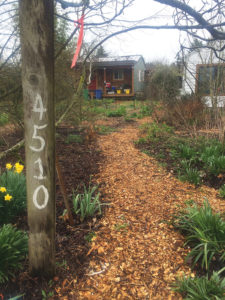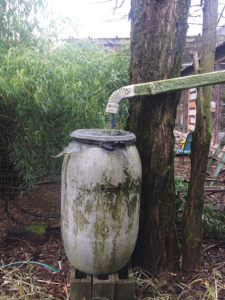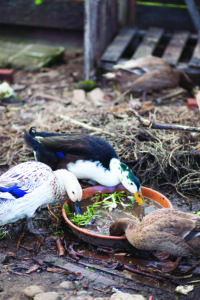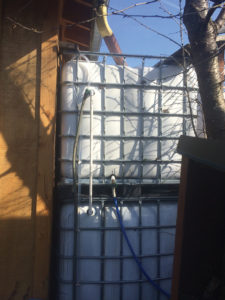By Rachel Freifelder

Before I tell you about my intentional community, let me tell you about my community.
I’m walking back from the Cully Urban Farm Store with 50 lbs. of duck feed in the wheelbarrow, when I meet my neighbor Carolyn on her way to get a newspaper from the corner store. She asks if I’ve heard about the emergency preparedness meeting next month, and if I would be willing to translate the flier into Spanish. (Of course I will.)
Since there are no sidewalks in the Cully neighborhood, I have twice the chance of running into a neighbor walking down the middle of the street. Our street is paved; some of the streets a few blocks away are still dirt, a holdover from when our neighborhood was an unincorporated rural area of the county. The city of Portland annexed Cully in my lifetime, some parts as recently as 1993.
I ask Carolyn how her blueberries did with last summer’s record heat, and how she thinks this winter’s lack of chill might affect fruiting. Though I’m an experienced gardener and landscape professional, Carolyn and her husband Bruce have mentored me on the finer points of Oregon fruit growing. They just celebrated 40 years at their half-acre urban farm, and they’ve seen some changes in the neighborhood and the weather.
● ● ●
When people ask where I live, I tell them, “When you look at the map of Portland, just south of the airport you’ll see an area where the streets are far apart.” Cully’s large lots, small houses, and more affordable housing prices have attracted urban farmers like Bruce and Carolyn for decades. I might add, “Cully is the place for folks like me who wish we lived in the country but have a reason to be in the city.”
Blueberry is a beloved fruit in Oregon, a significant share of the local economy, and the name of the intentional community I live in. We are intentional neighbors in three independently-owned houses, each on one-fifth-acre lots. The first house was purchased in 2006, the two flanking it in 2007. The front yards flow together without fences. The backyard fences were here when we arrived, and they keep Chris and Pat’s chickens out of my vegetable beds. My household, Chickpea Cottage, is a four-bedroom collective with 1300 sq. ft. of vegetable beds, 12 fruit trees, many berries and medicinal and native plants.
The organic process extends beyond our three houses as well. Five years ago a family moved in to the west of us, and we put a gate in the fence so the kids could come visit. (Pro tip: the gate swings into our yard, so we didn’t have to get their permission.) Another three houses across the street have taken down parts of their backyard fences, and a fourth neighbor bought an adjacent house because his son is in first grade with the six-year-old who is now next door.
● ● ●
I roll the wheelbarrow into our yard and greet my housemates. Tania is replacing the fittings on one of our rain barrels. We’ve graduated from two 55-gallon drums on one downspout to that much on each of two downspouts, plus five 275-gallon totes behind my detached bedroom at the highest point of our lot. Eventually we will have 3700 gallons of rain storage capacity, enough to get us through our summer irrigation needs. Tania was once a market farmer in rural Washington. Now she’s a civil engineer specializing in water quality, so she’s naturally taken charge of both the rain catchment and the greywater system. She aspires to plumb the rainwater through a potable water filter and back into the house. So far, we use both the rainwater and greywater for irrigation, and for cleaning things like shovels or root vegetables. Rainwater is much better for the duck pond than chlorinated water. And the rainwater often goes into the washing machine, the tea kettle, or the stock pot. It’s easier to boil rain water than filter out chlorine. Sometimes I use it cold out of the barrel to wash my face.
Bobby is sawing firewood for next winter. Heating with wood reduces our dependence on fossil fuels, but we’re aware that it also has an impact. We’re careful to season our wood and burn it as cleanly as possible in an EPA-certified stove. When we feel cold, we put on warmer clothes before we make a fire. The last person to bed opens the draft rather than damp the stove down, which would make black smoke from smoldering wood. Most of our wood is from the local waste stream and gets here without motor vehicles, in bike trailers and cargo bikes. Some is dropped off by arborists in big trucks, which were already on the road and would have taken that wood to the dump. As with everything we salvage, we know that someday demand will be higher and there will be less free firewood on the curb and in construction dumpsters.
I park the wheelbarrow and carry the two buckets of feed back to the duck house. Ellie, five, is riding her bike in her back yard and sees me. “Rachel! Rachel! Can we come over and visit the ducks?” Her brother Ethan, three, rolls up on his trike. “Hi Rachel—can I feed the ducks?”
“If it’s ok with your mom.” I wave to Diana, working on her laptop on their back deck. She waves back and nods. “Come on in.” I open the gate and they run in.
After Diana calls Ellie and Ethan home for lunch, I harvest a basket of mustard greens and take them down to Ralph and Velma. When I moved in, they brought me raspberries and green beans from their garden. Now both past 80, they live on Social Security. The only crop they still plant is tomatoes, and they really appreciate fresh organic greens.
● ● ●
Cully is one of the lower-income neighborhoods in Portland. Our surplus garden produce rarely goes to the food bank—it’s easier to put it directly in the hands of a neighbor whose survival is at risk.
Blueberry’s mission is to model a way of living on this land, in this bioregion, and in this city, that keeps our footprint small and our own survival more likely. Over the 13 years of Blueberry’s existence, we’ve hosted around 100 classes and tours. Native plants, drip irrigation, fermented foods, composting toilets, soil building, urban livestock, wild salads, winter harvesting, fruit tree pruning, and of course various aspects of vegetable gardening are just some of the topics.
What does this all have to do with climate change? Well, everything. Some of the skills we practice and share are directly related to keeping our carbon footprint down. Plenty of our food travels zero miles from garden bed to fork. That’s a lot of diesel fuel not getting burned.
Methane (CH4) in the atmosphere is far more powerful than CO2 at raising global temperature [www.scientificamerican.com/article/how-bad-of-a-greenhouse-gas-is-methane]. Sewers [“Methane emission from sewers.” Yiwen Liu, Bing-Jie Ni, Keshab R.Sharma, Zhiguo Yuan. Science of The Total Environment, Vol. 524–525, 15 August 2015, pp. 40-51] and landfills [www.epa.gov/lmop/basic-information-about-landfill-gas] release a lot of methane. Thus our composting, greywater, and humanure systems not only save water, but reduce our contribution to methane in the atmosphere.
Transportation. Most Blueberry folks are bicycle commuters. We don’t have rules against owning or driving a car; each of us has access to some motor vehicle for road trips or hauling really big things, but chooses to mainly get around by bike and transit. Our community culture supports biking. We have secure and convenient parking for our bikes and bike trailers, we go places together by bike, we have a dedicated bike repair space, we help each other work on our bikes, we’re friends with our neighborhood bike shop, we have a few loaner bikes (with locks and helmets) for out-of-town guests, etc.
Other things we do in the interest of sustainability may not make you think immediately of carbon, but all the aspects of the ecological footprint are related, as are all aspects of community resilience. How about knowing our neighbors?
Any cooperation will nearly always reduce the ecological footprint without even trying. Many people live together out of economic necessity, and the economies of scale start with sharing rent and utilities. This means that the amount of land, building materials, heating fuel, and electricity consumed per person is smaller. Our three houses share internet service, and for a while shared one washing machine for nine people. Anna can use my table saw any time, and I can use her band saw, so no need for duplicates.
Salvaging. In any US city one sees a shocking amount of perfectly good stuff in other people’s waste streams, enough that we risk clutter if we rescue it all. We wish there were less waste; for now, the more we salvage, the less we buy, and any brand new purchase has a footprint. Lumber is one thing we rarely buy new. In Oregon, logging is the single largest contributor to climate change, even worse than the burning of fossil fuels [www.hcn.org/issues/50.11/climate-change-timber-is-oregons-biggest-carbon-polluter; Oregon Global Warming Commission, Biennial Report to the Legislature, February 2017].
Community networks like Freecycle, Buy Nothing, Craigslist, and the rich tradition of the free pile mean that we rarely climb into an actual dumpster. We get building materials from several salvage yards as well.
No Trash! (or very little). Our community culture limits our waste stream as a group. We support each other in keeping our personal waste streams low. Shared meals and homemade treats reduce food packaging. The neighborhood buying club lets us order beans and grains in 25 lb. bags, oils in five-gallon jugs. The household I live in is the most hardcore: all food we buy as a group is in bulk, minimally packaged. If a resident buys themselves a packaged treat, they take responsibility for getting the package off the property, and there is no kitchen trash can. The only trash (or recycling) receptacle in any common space is a two-gallon bucket in the workshop; in a building project there is often some widget that can’t be obtained without a plastic blister pack, even with our best efforts to find used parts. There is also a tiny paper bag under the bathroom sink, for dental floss. Visitors have told us that our low-waste program has inspired them to reduce their own waste stream. That makes it feel so much more worthwhile; maybe we can slow the growth of the oceanic island of plastic.
Urban life. Most folks here have a priori reasons to be in Portland: jobs, school, family, community. I am the exception: In my 20s I was a founder of a rural community whose mission is to model ecologically sustainable living. I moved back to the city because I believed I would contribute more by doing this work in an urban setting. I also benefit from urban life: cultural diversity, a walkable neighborhood, activist community, a great music scene, and the ability to access it all without ever driving a car. I was car-free for 20 years, as are many urban residents.
Activism. We consider Blueberry to serve an activist mission, but we also put effort into the outside mission of the global climate activist community. I volunteer with Bark, a forest defense nonprofit, monitoring timber sales and leading interpretive hikes. Some of us are musicians and performed at the Climate Emergency rally (350.org and Extinction Rebellion). We all volunteer in our larger community.
● ● ●
At 2 pm some neighbors come over for a tour. They are part of an activist collective called Anarres Infoshop, planning to replicate our food growing and water harvesting systems. I suggest they also contact Carolyn and Bruce, who have a permitted potable water system connected to their 4000 gallons of rain storage. Ten years ago I would have shown them our DIY cold frames made of salvaged windows, but the last few winters have been so warm that we never set them up. After photographing the rain barrels they gather around the garlic bed for some weeding, the barter we had agreed on. I send them off with a few bags of kale.
Making our own fun. Dinner is by the fire pit at Alex and Anna’s house tonight. I dig up a few leeks and trim the leaves. The good parts of the green leaves go in the wok with an armful of chard. The tender white shanks go on the grill alongside new potatoes and marinated tofu. Tania picked up the tofu direct from the factory, to avoid the plastic package. Chris and Pat bring a bowl of steamed nettles. Duck confit that Anna made from last year’s drake rounds out our meal. None of us are vegetarian; instead we are mindful of the sourcing and quantity of meat that we consume. After dinner, Anna tunes up her fiddle and Alex sets up the washtub. I run and grab my guitar. Tania cracks open a bottle of her home brew and pours everyone a glass.
Rachel Freifelder was a cofounder of Blueberry (2007) and Dancing Rabbit Ecovillage (1993) (www.dancingrabbit.org). She has lived collectively almost continuously since 1986, with a few short breaks. Rachel studied ecosystem ecology, global climate change, and atmospheric chemistry as a graduate student at Stanford from 1990-93. She sings and plays guitar in radical folk duo Unincorporated and the jarana jarocha with Colectivo Son Jarocho de Portland.
All the people and events described in this article are real. Some names have been changed to protect privacy. All the events occurred, but not on the same day; the combining of all into one day is poetic license.
